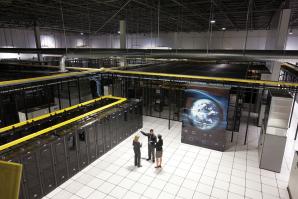For companies needing data security and backup, the Sacramento region boasts some of the safest and most affordable data centers in the West. It’s so desirable, in fact, that Twitter has joined Yahoo Inc., eBay Inc., Wells Fargo & Co. and a host of other Fortune 500 companies in storing its data in or near California’s capital.
Tim Burke, president and CEO of Quest, a technology management firm based in Sacramento, confirms that Twitter has signed a contract with RagingWire Enterprise Solutions in Natomas. A top executive at RagingWire was unable to comment on the record, but says, “anyone that had the Twitter account in their facility would be contractually bound not to tell you.”
Burke says he’s not surprised Twitter chose Sacramento.
“Sacramento is a drivable location [companies] can move people to from the Bay Area in the event of disaster,” he says. “It’s a neutral earthquake zone, … and [Sacramento Municipal Utility District] has a very popular rate.”
If Sacramento can provide the security and convenience Twitter, Apple Inc. and Otis Spunkmeyer Inc. need for their sensitive data, it can more than likely meet the needs of the Capital Region’s local businesses — including yours.
The problem, Burke says, is that so few companies have a concrete plan for data recovery and business continuity in the event of emergency. In Burke’s experience, if a company without an emergency management plan is hit by a disaster — be it flood, fire, robbery or a car through the storefront window — there is a 60 percent chance it will never get back up and running.
“Backup is a real problem in the industry. You hear problems about it all the time,” Burke says. “I actually talked to someone last week who backs up data to a cartridge and has someone take it home and keep it in the refrigerator. That’s their backup plan.”
Still, many companies that go so far as to develop a plan to back up and retrieve data in the event of crisis still fail to plan for assembling and coordinating their employees.
“Everyone wants to run to a product or service first thing,” Burke says. “Before you get technical, you need to understand what is important to your business and in what time frame you need that thing to be operational in the event you lose your facilities.
“Define those things. Those are not technical questions,” he adds. “If your phone system goes away, what happens? If you’ve backed up your data but you have 10 people who do nothing all day but take phone orders, what do you do? I don’t care if you have your database backed up if you can’t take orders. You need to be thinking from that perspective.”
Once a company identifies its greatest risks and needs — be it refrigeration, computers or the CEO — it can define a plan and begin to implement the services and products needed to put the plan into action.
That’s where companies like Quest, RagingWire and Herakles Data come into play.
About 65 percent of Herakles’ customers seek business continuity or data recovery tools, says Lou Kirchner, the company’s president and CEO. Herakles, located in Sacramento, can replicate not only the software that companies need to function, but also the data included in production programs.
If a business loses its primary office space, Herakles and other data management companies can also provide the necessary connectivity and workspace as well.
“In addition to hardware, software and IT, you need a place to house the critical people who invoice customers and pay vendors,” Kirchner says. “We have partnered with a company that provides mobile business continuity space and provides a state-of-the art environment with computer connections to our data center.”
Burke has one client in particular who works in financial services and would need to be fully operational with access to the stock markets within 15 minutes of losing its current facility.
“I don’t know how fast you can drive, but we can provide that facility where everything is replicated,” he says.
So how much data storage does your business need? RagingWire operates a 220,000-square-foot data center and recently confirmed plans to build a second data center adjacent to its current facility. Herakles has some customers that take up more than 2,500 square feet of space, while others have all their needs met in a small cabinet.
“There is a perception out that disaster recovery is expensive,” Burke says. “I don’t know where that has come from. Technology has advanced. It doesn’t have to be expensive and complicated. It can be reasonable to get you a fairly high level of security and disaster planning. Really, the question is how much can you afford to lose?”
Recommended For You

Cumulous Data
The opportunities and hazards of cloud computing
While most businesses are postponing investments and stashing cash, at least one expense is expected to grow this year: information technology.

Computing Litigation
California law reaches toddler stage as lawyers struggle to keep up
The state law requiring the use of electronic documents as evidence in civil lawsuits, also known as e-discovery, turns two next month, and local attorneys say its application is still in the developmental stages.


